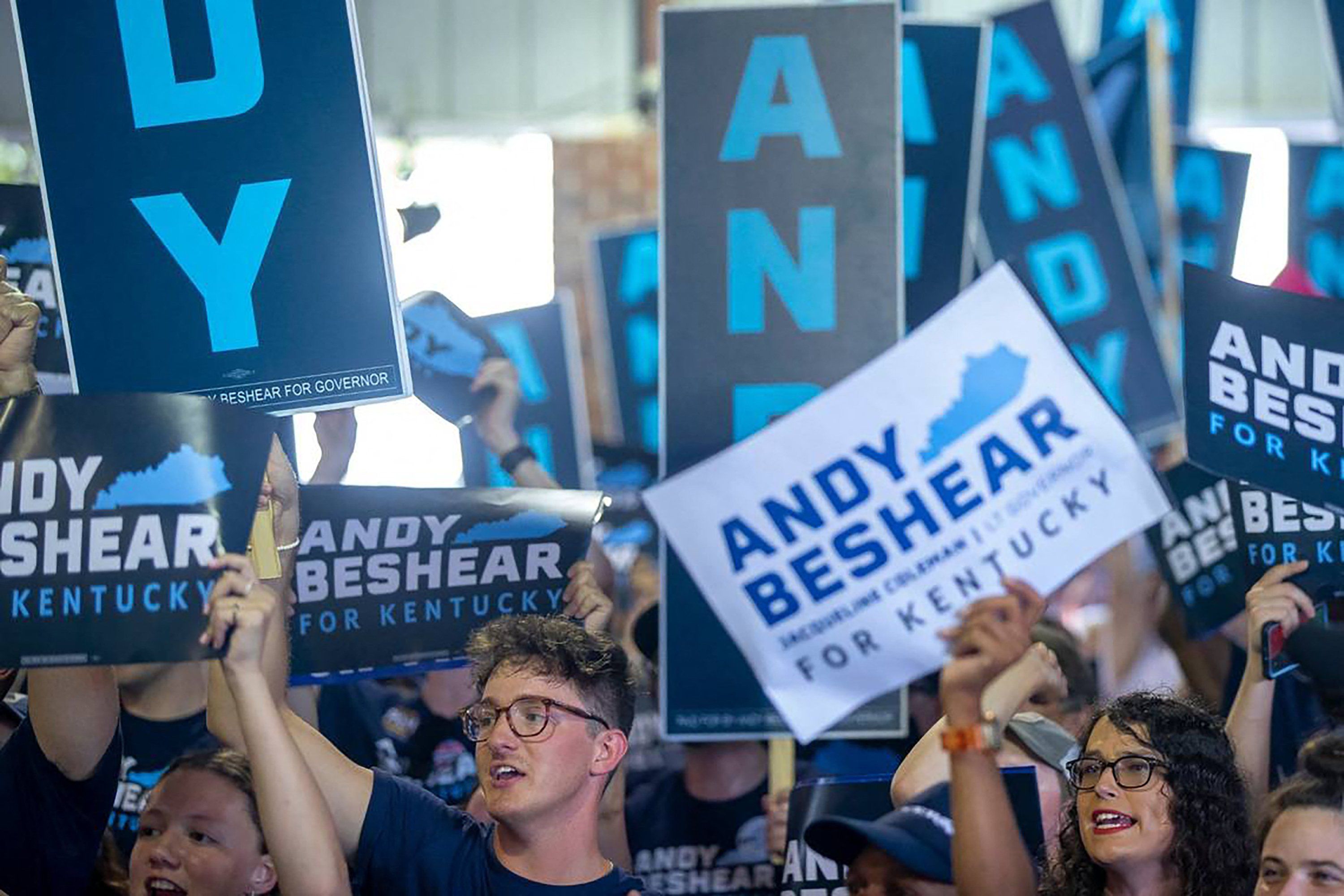Amid primary debates, early swing-state polls, and campaign events, it’s safe to say that much of the political focus in the US is already on the 2024 elections, which appear likely to feature a rematch between President Joe Biden and former President Donald Trump. This anticipation will heighten the scrutiny of a slew of state and local elections and ballot measures on Nov. 7 – the last chance to gauge voter sentiment on key issues ahead of the main event next year.
Eurasia Group expert Kylie Milliken will be following the Kentucky gubernatorial race, Virginia’s state legislative elections, and an Ohio ballot referendum closely. We asked her to explain.
What’s at stake in a Democratic governor’s reelection bid in Kentucky?
Although Kentucky is a red state, the party that has won the governor’s mansion there has gone on to win the White House the following year in every political cycle for the last 20 years. The off-year gubernatorial race generally gives a sense of the set of issues that matters most to independent and moderate voters, including issues that drive turnout. This year, popular Democratic incumbent Andy Beshear is expected to beat his challenger, the Trump-endorsed, highly conservative Attorney General Daniel Cameron. Although it will likely be a close race, Beshear is favored to win a second term, given his high approval ratings (even among Republicans) and his position on the issues.
If Beshear does win, what would that signal?
A few things, I think. The first would be that a focus on jobs can help mitigate criticism of Biden on inflation. Voters hold Biden responsible for high prices, and inflation will almost certainly be an issue that hurts Biden politically in 2024. However, running on the strong labor market, as Beshear is doing, could help Biden on the margins. The second is that abortion will turn out Democratic voters and attract independents and moderates to Democratic campaigns. Beshear is campaigning on the issue and criticizing Cameron’s extremely conservative stance, including his support for a proposed anti-abortion amendment, which Kentucky voters rejected by 4.7 percentage points in 2022. Lastly, a Beshear victory would signal that culture war issues won’t necessarily drive turnout or convince independents to back Republicans. Cameron is running on a conservative education and LGBTQ+ platform that many Kentucky voters would likely support, but a Beshear win would indicate that other issues are more important.
What’s the relevance of a new referendum on abortion in Ohio?
Ohio, once considered a key swing state, is now decisively red – the Republican Party controls the state legislature and governor’s mansion, and Trump won the state by 8.1 points in both 2016 and 2020. The Ohio ballot measure is the only abortion referendum taking place this year, and anti-abortion activists have argued that they have a better chance of success both because of the state’s conservative bent and their ability to focus all their resources on Ohio.
However, past referenda on abortion have all gone the pro-choice way, regardless of the political tendencies of the state, and the Ohio referendum is likely to do the same. The first poll shows strong support for abortion access, with 58% in favor of passing the ballot measure. Some think that the salience of abortion will decrease over time, minimizing the extent to which Democrats can win on the issue. However, the longer there are bans in place, the more people are affected and the more unpopular the bans have become. If abortion passes in Ohio by a wide margin and with a high turnout, as is expected, it will demonstrate that the issue is still galvanizing voters, which will likely benefit Democrats.
What are the key issues shaping Virginia’s legislative elections?
Abortion is also shaping up to be a major issue in the Virginia legislative elections – but in a different way. While the Ohio referendum will gauge voters’ support for abortion in general, the Virginia legislative races will test voters’ preferences for a 15-week ban.
Republicans have consistently struggled with their messaging on abortion since the Dobbs decision, as they must attempt to find a balance between being pro-life enough to win primaries and pro-choice enough to appeal to a wider audience in general elections.
Virginia’s Republican governor, Glenn Youngkin, is attempting to walk this fine line by advocating for a 15-week ban if Republicans keep the state House and flip the state Senate in the Nov. 7 elections. State-level Republican legislative candidates have taken up his message, increasing the salience of the issue in the campaign. If the GOP performs well in Virginia, it will give Republicans across the US a new strategy on abortion messaging that may prove to be more electorally successful than advocating for strict bans.
